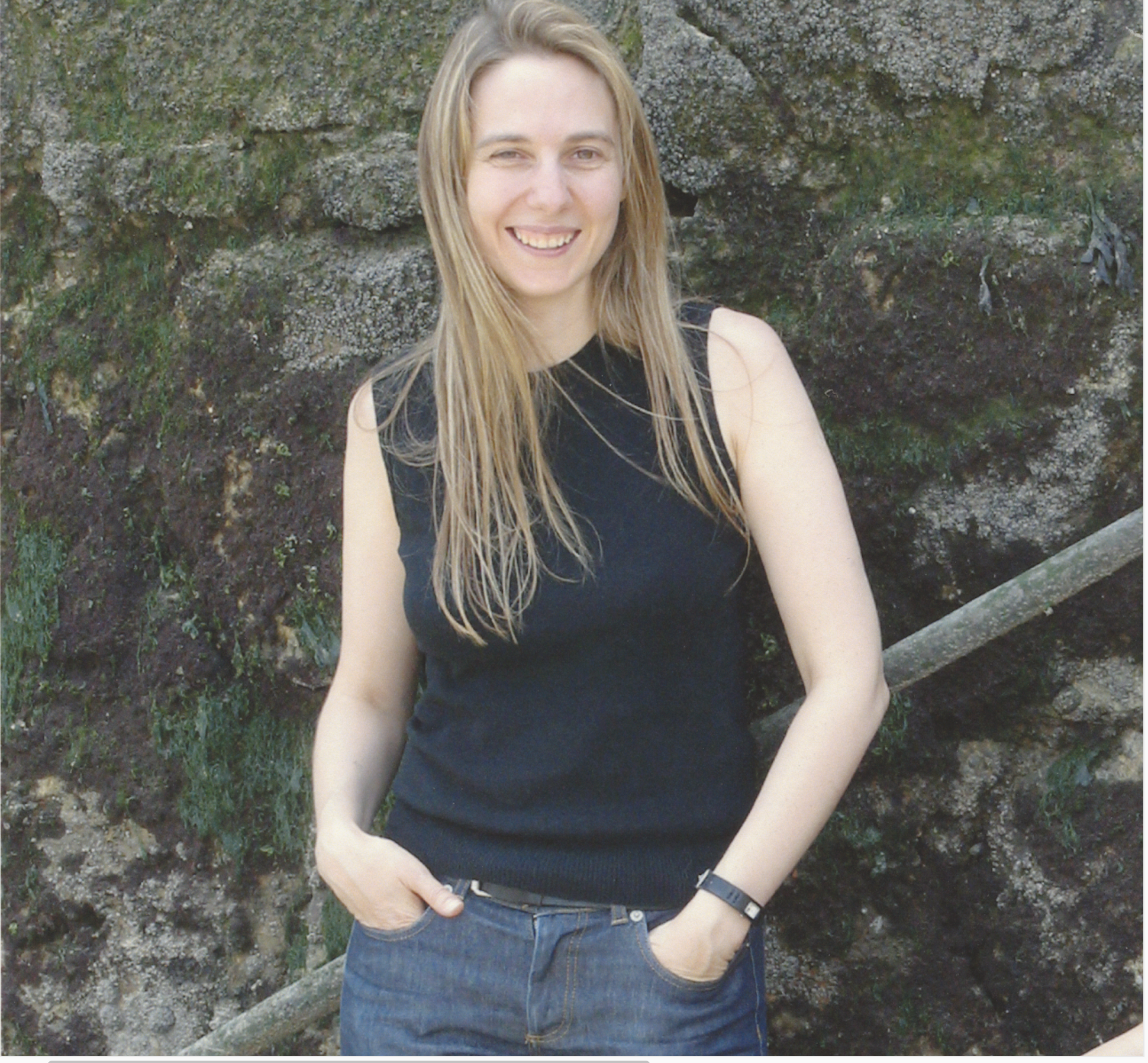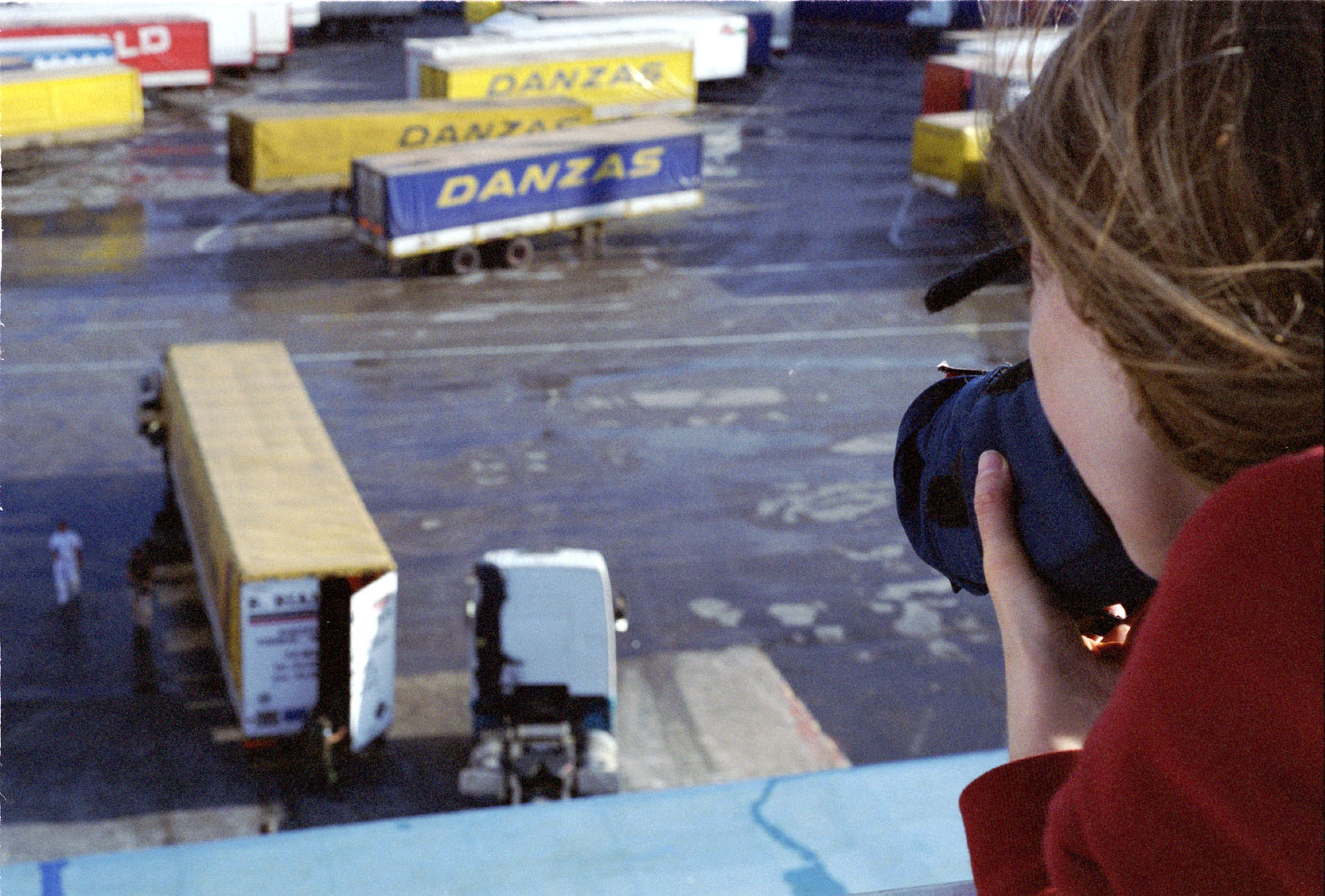Biography
Born in London in 1970, Laura Waddington has lived around the world. She is half British and half Irish. After studying English literature at Cambridge University, she moved to New York where she worked in independent cinema and began to make short films. Fascinated by how technology, and the internet, were about to transform our perceptions, she embarked on a series of experiments, learning to film without using her eyes. Her early videos of the 1990s—Zone shot on a cruise ship, with a spy camera sewn into her jacket and The Lost Days, directed via the internet with friends and strangers filming on her behalf in fifteen countries—experimented with the frontiers of the medium, creating fictional journeys out of intricately reworked documentary footage.
A series of pivotal encounters during those years (in which she lived in the US without residency papers), including the sinister reality glimpsed when she was detained in an immigration cell on the Canadian-US border, contributed to a deepening preoccupation with tales of people stranded in liminal spaces, and issues of statelessness and migration.
Moving to Paris by way of Lisbon and Barcelona at the start of the millennium, she began to increasingly focus on borders, refugees, and the hidden cost of globalisation, travelling extensively by bus, train and boat around the edges of Europe, the Balkans, Kurdistan and the Arab world, with a small video camera. Cargo (commissioned by the International Film Festival Rotterdam for the 30th anniversary project On the Waterfront), filmed on a container ship with Filipino, Romanian and Polish sailors bound for Syria and Lebanon, won several awards including the ARTE Prize for Best European Short Film at the 48th International Short Film Festival Oberhausen.
Border, shot over several months in the fields around Sangatte Red Cross camp in France, documented the nightly attempts of Afghan and Iraqi refugees to make their way through the Channel tunnel to Britain. After premiering at the Locarno International Film Festival, it went on to screen in hundreds of locations worldwide and received a number of awards.
In 2006, Waddington travelled to Jordan to meet people fleeing the Iraq war, spending several months gathering testimonies and later returning to live in the region. Her faith in her practice was shaken when a young Iraqi man recounted to her his experience of mistaken imprisonment and torture in a pitch-black cell for two years during Saddam Hussein’s regime. Haunted by his tale but unable to find the production funds or an effective way to depict it in a film without revealing his identity, she eventually decided to teach herself to draw. M’s Story is a hand-drawn documentary on paper, inspired by comics—the words precisely as the anonymous ‘M’ told them but the images only from Waddington’s imagination. Intended to be presented in book and rudimentary exhibition form, it was selected as a finalist for the Puchi Award 2026 (forthcoming publication).
Waddington’s written book, The Iraqi Suitcase is a hybrid of notes and narrative drawn from the diaries that she kept during the months she spent with Iraqi refugees in Amman in 2006, and revisited during the pandemic lockdown in Lisbon. Illustrated with stills from her unreleased videos of the time, it chronicles the scars that totalitarianism and conflict leave on individuals’ lives, while confronting, in tandem, the limits of bearing witness with a video camera (forthcoming publication).
Laura Waddington’s films and videos have been shown widely at international film festivals, including Locarno, Rotterdam, the New York Video Festival at the Film Society of Lincoln Center, Montreal (FCMM), London, and the Pan-African Film and Television Festival of Ouagadougou (FESPACO). They have been broadcast on European public television (ARTE, ZDF), and presented in museums such as the Reina Sofia Museum, Madrid, the Jeu de Paume, Paris, the Walker Art Center, Minneapolis and the Wifredo Lam Contemporary Art Center, Havana. Her videos are part of public collections including that of the Centre Georges Pompidou, Paris and the Bibliothèque nationale de France. Focuses and spotlights on her work have been held at the 51st International Short Film Festival Oberhausen, the 41a Mostra Internazionale del Nuovo Cinema Pesaro, the Centre Pompidou and the Austrian Film Museum, Vienna. She has spoken at venues including the European Parliament in Brussels, the British Film Institute, London (via video address) and the Flaherty Seminars, New York. In addition to her films and other projects, Waddington publishes essays and reflections on cinema and art internationally. Her work has been the subject of considerable scholarly discussion, including in the final chapter of Georges Didi-Huberman’s seminal book on cultural transmission and resistance in dark times, Survivance des lucioles (Survival of the Fireflies), and in writing by Scott MacDonald and Paweł Mościcki, to name a few.

Short Bio
Laura Waddington makes films, books and other projects, with a particular focus on issues of migration and statelessness and experimentations with form. Her films and videos have been shown widely at international film festivals including Locarno, Rotterdam, the New York Video Festival at the Film Society of Lincoln Center, Montreal (FCMM), and London, and in museums such as the Reina Sofia Museum, Madrid, the Jeu de Paume, Paris, the Walker Art Center, Minneapolis and the Wifredo Lam Contemporary Art Center, Havana. Focuses and spotlights on her work have been held at the Oberhausen International Short Film Festival, the Pesaro International Film Festival, the Pompidou Center, Paris and the Austrian Film Museum, Vienna. She is the recipient of several awards, including the ARTE Prize for Best European Short Film. She has spoken in venues such as the European Parliament, publishes articles on film and art internationally and has lived around the world.
Selected FILMOGRAPHY ANd BOOKS
1992 The Visitor
1994 The Room
1995 Zone
1996 Letters to My Mother
1999 The Lost Days
2001 Cargo
2004 Border
2009 Still
TBA M’s Story
TBA The Iraqi Suitcase

Back to top